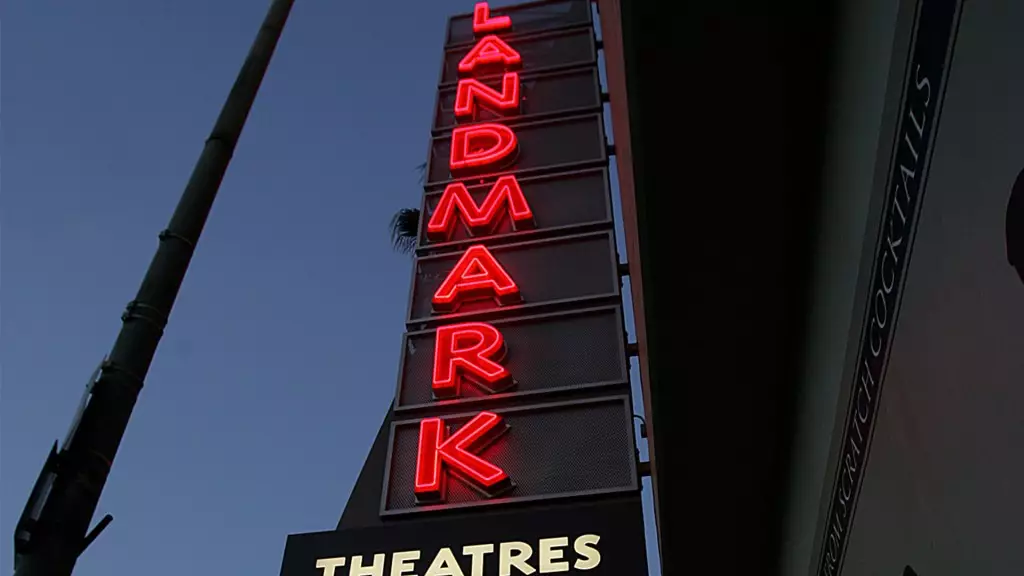The cinematic landscape has endured seismic shifts in the past few years, with many theaters grappling not just with the implications of a global pandemic, but also with fluctuating economic conditions and industry strikes. Among those feeling the brunt of these changes is Landmark Theatres, once a bastion of arthouse cinema. As the company faces an impending auction of its properties and sustained financial hardships, the story of its decline underlines deeper industry trends and challenges.
A Financial Freefall: The Impact of External Forces
Landmark Theatres has suffered a staggering reduction in value estimated in the hundreds of millions, as revealed in a deposition by Charles Cohen, the owner of the chain. This decline has been exacerbated by the cumulative effects of the COVID-19 pandemic, a rise in interest rates, and labor strikes that have halted Hollywood productions. The staggering financial losses have pushed Cohen into a legal battle with his lender, Fortress Credit Corp., as tensions mount over defaulting on a significant loan.
Cohen’s deposition, which surfaced amid ongoing litigation, highlights the dire state of Landmark’s financial position. With revenues plummeting and expenses spiraling upwards, the auction of Landmark’s assets appears inevitable, barring a potential settlement. The urgency is palpable; a court-mandated auction date looms on November 8, pressing the company toward a critical juncture in its operational life.
The Struggles of a Historic Brand
Founded as a premier arthouse chain, Landmark has specialized in showcasing independent films and fostering a unique cinematic experience. However, this niche focus has proved increasingly vulnerable as shifting market dynamics and declining foot traffic have led to profound losses. Cohen’s admission that Landmark faced a net revenue loss of over $14 million emphasizes the struggle to maintain a viable business model amidst changing consumer habits and industry disruptions.
Compounding these challenges is the fact that Cohen acquired Landmark at a particularly precarious moment in history, just before the pandemic forced theaters to close and fundamentally altered entertainment consumption. The effects of Hollywood strikes further hindered any potential rebound, leading to a scarcity of new films and a subsequent decline in audience attendance. As theaters across the nation grapple with these ongoing issues, Landmark’s unique identity may be at stake.
Central to Landmark’s current predicaments are the legal disputes arising from Cohen’s alleged defaults on loans. Fortress Credit Corp. has taken a hardline stance, seeking to protect its financial interests by enforcing asset restrictions on Cohen. This includes recent claims that Cohen has engaged in asset transfers to shield his wealth from creditors. The implications are severe: Fortress seeks to freeze Cohen’s personal assets to ensure that the potential shortfall from the auction does not go unmet.
This legal maneuvering exposes not only the fragility of Cohen’s personal finances but also the uncertain future of the Landmark brand, which, despite its historical significance, may not be immune to the legal ramifications of its owner’s financial mismanagement. As the litigation unfolds, questions about the sustainability of Landmark’s operations loom large.
Despite the realities of financial distress and impending auctions, there remains a glimmer of hope as Cohen expresses optimism about reaching a settlement. Landmark’s commitment to staying in operation, coupled with ongoing dialogues around the future of cinema, speaks to broader shifts in the industry. The landscape of moviegoing is evolving—audiences are now being courted through innovative marketing and enhanced viewing experiences.
Landmark’s move to shutter its flagship Westside LA location reflects broader trends in cinema attendance and audience preferences. Increasingly, films are competing against an array of entertainment options, and theaters must adapt by blending classic arthouse offerings with broader commercial releases to appeal to diverse demographic groups. The question remains: can Landmark navigate these treacherous waters?
As Landmark Theatres grapples with financial woes and legal entanglements, its future hangs in the balance. The challenges of high interest rates, production halts due to strikes, and evolving audience preferences create a multifaceted environment that is difficult to navigate. Nevertheless, the commitment expressed by Cohen to keep Landmark operational reflects a desire to adapt and survive.
While the auction of Landmark’s properties is imminent, it is crucial to reflect on the potential outcomes. A recovery and restructuring plan may provide the platform for Landmark to pivot back into the spotlight of the cinematic world. The key driver will be the ability to resonate with new audiences and adjust operations to meet the changing demands of moviegoers in a post-pandemic world. The road ahead may be fraught with challenges, but the hope for a brighter future remains alive.

